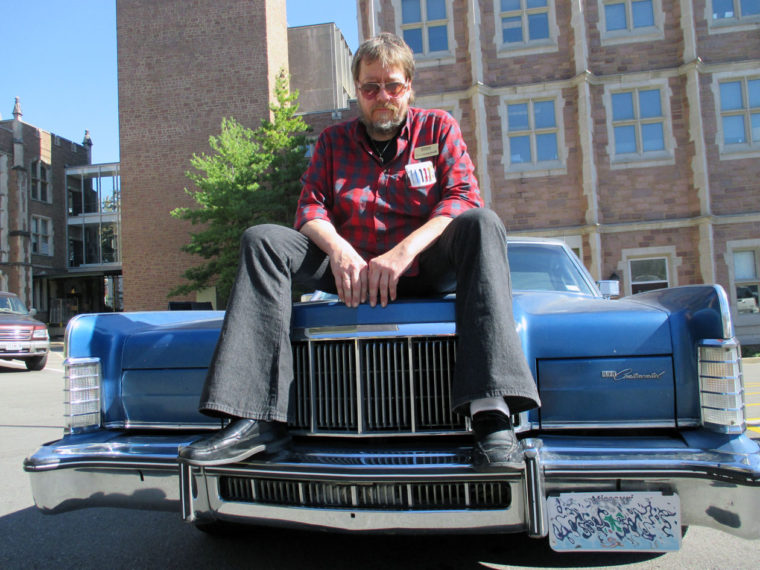If you ever find yourself in Rebstock 133, you can expect to be greeted by a tall man wearing bell-bottoms and aviator sunglasses. On some days, he wears a baseball hat that has a snout in the front and a pigtail sticking out from the back. He wears it backwards.
Meet Gerry Rohde, who works in the Department of Biology in Arts & Sciences at Washington University in St. Louis. Stockroom manager and lab safety officer by day. St. Louis Public Radio host by night. And collector of classic automobiles.
Despite his easygoing nature, Rohde takes his responsibilities seriously. As the lab safety officer, he ensures sharps, chemical waste and biological waste are disposed of properly. He writes a “Safety Spotlight” for the Biologue, the department newsletter, to keep the community up to date on topics related to laboratory safety. And he serves as the liaison between Environmental Health and Safety and the department.
Rohde started his 25-year career at Washington University in 1993 when he took a position working in the stockroom in the Department of Chemistry. Four years later, he transferred to the Department of Biology, where he manages the stockroom and ensures the community is adhering to lab safety practices.
The department’s stockroom fulfills multiple purposes. First, it stocks common laboratory supplies and chemicals, offering a convenience to scientists who may realize mid-experiment they don’t have enough of a critical reagent. Waiting even one day for the replacement to arrive could ruin the experiment. “We are a recharge center,” Rohde said. “The stockroom has 480 or so items in stock at any given time.”
Second, it takes care of the time-consuming administrative efforts that entail purchasing laboratory supplies and chemicals from outside vendors. “We purchase anything from bullfrogs to restriction enzymes. There is no way that we could possibly stock all of this stuff,” Rohde said.
Besides purchasing, the stockroom is also the receiving and redistribution center for the biology department. When shipments come in, the stockroom staff check the packing slip against the contents and the purchase order. Laboratory staff have to sign for their purchases.
The four-member team also serves as the point of contact for receiving and distributing common supplies such as dry ice, liquid nitrogen and compressed gases.
All of the office supplies run through the stockroom; not every department does this. Because the biology department is so large and accountable for many laboratories, years ago administrators decided to offer office supplies through the stockroom to ensure that they were charged to the department and not to government grants.
One could argue departments don’t really need a stockroom, but the numbers say the opposite. “When I first started in the biology department’s stockroom, there were about $80,000 worth of yearly sales. Today, we get $130,000 worth of yearly sales,” Rohde said.
The community appreciates the service — and his personality. Rohde is quick to welcome his customers. If his outfit does not spark your interest, perhaps his St. Louis Public Radio nametag will.
Rohde has been with Public Radio 90.7 KWMU since 1985. For years, he did an overnight jazz show, along with some classical music announcing and programming during the day.
“It was the age of the audio cassettes, when you couldn’t listen to music on the computer,” Rohde said. Radio played a major role in bringing music to its listeners. But in the ’90s, it became clear that the landscape was changing. With advancements in technology, radio no longer was the primary mechanism for listening to music.
Public Radio adapted by running more shows and less music. As did Rohde. Since 1996, he has been the evening host and runs the programming weeknights from 7-11 p.m. He also manages station breaks every 10 to 15 minutes. “You will hear me on the air. I will do the weather a couple times an hour. I will keep an eye on traffic,” Rohde said.
As the years go by, Rohde has asked whether there still is a role for radio in society. “Among young people, there has been a drop-off in radio ownership in the household by 38 percent.” But he believes that radio is a public necessity for those who do not own a phone. “And our membership is up and just surpassed 26,000 people; there is a role.”
For Rohde personally, radio has and will always play an important role in his life. Being raised in Bremen, Germany, Rohde recalled listening to his dad’s radio.
“It got stuck on the American Forces Network, which was broadcasted in American English, playing American music. As a little kid, I was glued to the radio. I had a real love for American English and the music,” Rohde said.
“It is funny that it combined later in life. I am not only working in radio, I am doing it in America,” Rohde said with a laugh.
It was also in America that Rohde developed an interest in cars. “American cars were so much larger than German cars. They really fascinated me,” he said.
When he moved to the United States to attend the University of Missouri- St. Louis, he bought a 1971 Ford Torino four-door. He paid $75 and half the driver’s door was rusted away; out of necessity, he started learning how to fix that car.
Today, he owns an award-winning 1971 Lincoln Mark III show car, a 1976 Lincoln Continental daily driver, a 1989 Suburban 4×4, and a 1981 4×4 four-door pickup.
“And the rest is history,” Rohde said with a smile.
